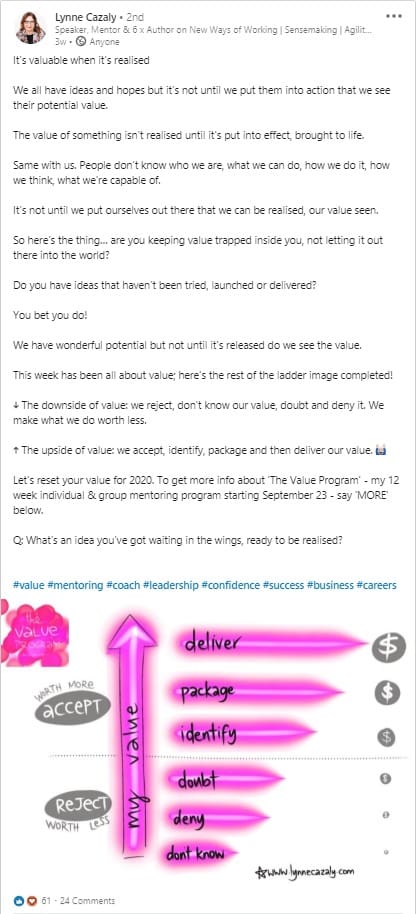
Do you struggle with perfectionism? Author and keynote speaker Lynne Cazaly shares some insights around the disease called perfection.
In Episode 70 of the Bean Ninjas Podcast, CEO Meryl Johnston talks to Lynne Cazaly about perfectionism and the ways it can cause more harm than good.
Lynne Cazaly helps individuals, teams and organisations transition to new ways of working. She is an international keynote speaker, author of 6 books and a master facilitator.
Lynne is also a communication specialist, having lectured in under-graduate and postgraduate programs in several of Australia’s Universities. Additionally, she did consulting on engagement, communication and change in various fields.
Her latest book is called “ish: The Problem with our Pursuit for Perfection and the Life-Changing Practice of Good Enough”.
If you are are often being called out for being a perfectionist, make sure to tune in/read on. You will learn that, in some industries, perfectionism can actually hurt your career.
Related: Moving Through the Challenges of Perfectionism at Work
Learn about the downside of being a perfectionist from Lynne Cazaly. #perfectionist #standards #achievement Share on XLynne Cazaly’s “-ish” concept (and why perfectionism has little benefit)
Lynne came up with the “-ish” concept when she realised that the benefits of being a perfectionist at work are close to zero.
If you are working with different audiences or different stakeholders on a daily basis, it’s likely that you’ve had the urge to control everything. Lynne has had similar experiences in the past, so she decided to change her mindset.
Here are some valuable lessons you can pick up from Lynne’s own experience:
For you to finish your part of a task or project on time, it’s necessary that you understand that achieving perfection is impossible. Instead of wasting time trying to improve everything, recognize that things are already good enough.
That way you’ll achieve a productivity win without doing unnecessary work. Realizing that the extra effort you are putting in may not make a big difference is what will benefit you the most.
On the other hand, if you are the one delegating the work, you have got the responsibility of setting the standards.
“Too often, what the standard is, is a deadline. We say to people: it’s due on Tuesday, or could you get that done by five o’clock. And what happens is people put a lot of effort in between now and the deadline.
But they have no clear concept of what the standard is that they’re going for.
And this is why people do all nighters, you know, and they put extra extra hours in, because we know what the expectation is, we’re just trying to go for the best, the best we could possibly do.
So as a leader, I think it’s really great if you can clarify for people, not only when is it due but what’s the standard you’re expecting.”
Bottom line, if you are a leader, you must make sure that you’re being clear about expectations. Note that if they are too high, that could force valuable employees to resign.
Related: Are Your High Expectations Hurting Your Team?
Lynne applied the concept to the writing of her latest book.You can do that with all sorts of things: preparing reports, presentations, etc.
If you put in a mere 20% of efforts to get a massive 80% of the job done, you will spare yourself the stress, anxiety, depression, suicidal thoughts, overwork, insomnia, migraines, asthma, etc.
Related: The 80/20 Rule Explained
Indeed, continuing to push yourself towards imaginary standards can impact your health dramatically. Instead, realize that you can’t get to perfect anyway: things will be imperfect in the end.
How to abandon the perfectionist mindset according to Lynne Cazaly
Do a self assessment to see how much are you doing what’s called maximizing or trying to make everything amazing. Realize that it actually doesn’t have to be like that.
Instead, determine the high value tasks that actually matter. Identify what your preferences might already be, and how maximizing can take up so much time.
If you are never satisfied with the results, that flows on into all areas of your life. Also, it can make you difficult to work with.
“If anyone that comes in early, stays back late, doesn’t go to lunch doesn’t have breaks… there’s a couple of people in the business, they’re not taking their holidays with this feeling of: I have to be here to be in control of everything and know what’s going on.
So these are all a sort of red flags for leaders to just look a bit closer and go, is this person going for perfect? Are they going through perfectionism? And then the flying effect is they are often holding up processes or projects.
You’ll often find information sitting in these people’s inboxes or in their tasks or on their Trello boards or wherever and things that are being blocked. They are blockers to progress.
And it’s because they’re worried about the quality of it putting out it’s not good enough yet, I still need to check that some more facts, I still need to get data, I can’t get this wrong.”
Understand that this sort of thinking is absolutely behind the perfectionist/overcompensating behaviors. Moreover, it can lead to delays in delivering services to your clients.
As a result, your client will go to a competitor who’s got a little bit more of an ish attitude on the things that don’t matter.
Strive to becoming agile, intuitive and adaptive instead. This way, you’ll add up to the creation of an environment of achievement.
Restrain from being someone who slows things down or blocks them, driving for perfect. You’ll grow out of it once you realize that this is something that can and should be changed.
Lynne describes it as an overcompensation, doing extra activity as a way to be seen.
Related: What Causes Perfectionism and How to Get Over It
“To acknowledge this first is the thing to do. And what happens when people start acknowledging it and understanding more about Ish is they start to see it themselves, they will start to see where they’re maximizing or doing too much for something.”
Learn why perfectionism often holds us back from this video:
Striving for perfection? Find out how that can backfire on you professionally in this chat with @lynnecazaly. #success #perfectionism #work #life Share on XHearing @businesschicks + Elle McPherson speaking on perfectionism in the media & how debilitating it is; here’s some reading material: my book ‘ish: The Problem with our Pursuit for Perfection and the Life-Changing Practice of Good Enough’ #perfectionism https://t.co/NSsN61bGHQ pic.twitter.com/CHEevuIBbk
— Lynne Cazaly (@lynnecazaly) September 19, 2019
Listen in to know more about the dangers of being a perfectionist at work from author and keynote speaker Lynne Cazaly.
Meryl and Lynne Cazaly discuss:
- How Lynne Cazaly transitioned from being a perfectionist to being agile
- Coming up with the “Ish” concept
- How Lynne Cazaly applied the concept while writing her book
- Why being a perfectionist can hurt your career
- Ways to grow out of the perfectionist mindset
- How Lynne Cazaly understands financial freedom
- How basic knowledge in accounting helped Lynne Cazaly’s career
Resources mentioned in this episode
Writer to add a list of resources mentioned in the episode (and links to them online)





